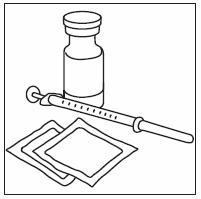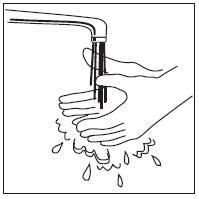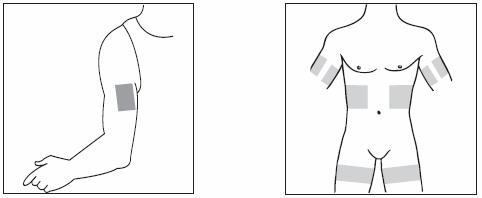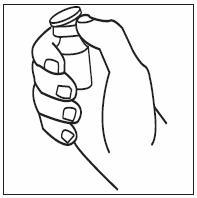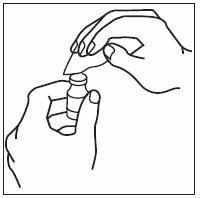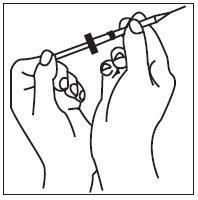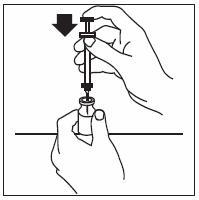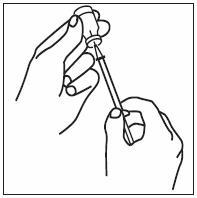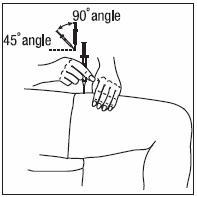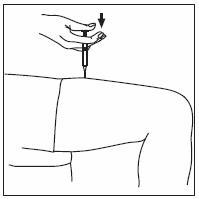INFERGEN- interferon alfacon-1 injection
Valeant Pharmaceuticals, Inc.
----------
MEDICATION GUIDE
INFERGEN®
(Interferon alfacon-1)
Suspension for Injection
Read this Medication Guide carefully before you start taking Infergen (In'-fer-jen). Read the Medication Guide each time you refill your prescription because new information may have been added. You should also make sure that the pharmacist has given you the interferon your healthcare provider prescribed for you. The information in this Medication Guide does not take the place of talking with your healthcare provider about your medical condition or treatment.
What is the most important information I should know about Infergen?
Infergen is one of the treatments used for some people who are infected with the hepatitis C virus (HCV). Infergen can have serious side effects that, in a few people, may lead to death. Before starting treatment, talk to your healthcare provider about the possible benefits of Infergen and its possible side effects to decide if Infergen is right for you. While taking Infergen, you will need to see your healthcare provider regularly for medical exams and lab tests to make sure your treatment is working and to check for side effects.
The most serious possible side effects of Infergen include:
Mental health problems: Infergen may cause mood or behavior problems. Some of the signs of these problems include irritability (getting upset easily), depression (feeling hopeless or feeling bad about yourself), nervousness, anxiety, or aggressive behavior. Some patients may have thoughts of hurting or killing themselves or other people or may attempt to do so.
Tell your healthcare provider if you are being treated for a mental illness or had treatment in the past for any mental illness, including depression and suicidal thoughts. Former drug addicts may lapse back into drug addiction or overdose. You should tell your healthcare provider if you have ever been addicted to drugs or alcohol.
Blood problems (bone marrow toxicity): Infergen can cause a drop in the numbers of two types of blood cells (white blood cells and platelets). Infections and bleeding can happen if these blood counts fall to dangerously low levels.
Heart problems: Infergen may cause high blood pressure, a very fast heart beat, chest pains, and a heart attack. Patients who have heart problems may have a higher chance for heart problems with Infergen. Tell your healthcare provider if you have or have had any heart problems.
Autoimmune problems: These are diseases that happen when the body’s own immune system begins to attack itself Infergen may cause autoimmune disorders such as psoriasis or thyroid problems. Infergen may worsen an autoimmune disease that you already have.
Body organ problems: Infergen may cause problems with your lungs (such as trouble breathing or pneumonia), and stomach pains, nausea and vomiting, and eye problems that can cause blurred vision or cause you to lose your vision.
Call your healthcare provider right away if you develop any of the following:
- depression or have thoughts about hurting or killing yourself or others
- trouble breathing
- severe chest pain
- severe stomach or lower back pain, bloody diarrhea or bloody bowel movements
- poor eyesight
- skin turns yellow
- become pregnant
- a high fever
- unusual easy bruising, or bleeding
For other possible side effects, please read the section “What are the possible side effects of Infergen?” in this Medication Guide (below).
What is Infergen?
Infergen (Interferon alfacon-1) is a medicine used to treat adults with lasting (chronic) hepatitis C virus (HCV) infection. HCV is a liver disease that is caused by the hepatitis C virus and is spread by contact with the blood of a person carrying the hepatitis C virus. Most people who get HCV carry the virus in their blood for the rest of their lives. Most of these people will have some liver damage, but many do not feel sick from the disease. Some people will develop a badly damaged or scarred liver (cirrhosis). Cirrhosis can cause the liver to stop working.
Your healthcare provider will tell you if the hepatitis C virus you have is resistant (type 1 virus) or easier to treat (type 2 or 3 virus) and the chance of treatments working. Infergen may lower the amount of the hepatitis C virus in the body so that it cannot be measured by blood tests. Your healthcare provider should do regular blood tests to check for side effects and your response to treatment.
It is not known if Infergen can cure HCV (permanently get rid of the virus) or if it can prevent liver failure or liver cancer that is caused by HCV infection.
Infergen therapy alone or in combination with other treatments will not prevent a person with HCV from giving another person the HCV infection.
Who should not take Infergen?
Do not take Infergen if you:
- are pregnant or breast feeding or planning to become pregnant
- have autoimmune hepatitis (hepatitis caused by your immune system attacking your liver)
- had an allergic reaction to another alpha-interferon medicine or are allergic to any of the ingredients in Infergen (See the ingredient listing at the end of this Medication Guide)
Before starting Infergen, tell your healthcare provider if you have or ever had any of the following conditions or serious medical problems:
- depression or anxiety
- sleep problems
- drug or alcohol addiction or abuse
- high blood pressure
- heart problems
- liver problems (other than HCV)
- autoimmune disease such as psoriasis, systemic lupus erythematosus, or rheumatoid arthritis
- thyroid problems
- diabetes
- colitis (an inflammation of the bowels)
- cancer
- hepatitis B infection
- HIV infection
- kidney problems
- blood disorders
- taking a medication that suppresses your immune system
Tell your healthcare provider about all the medicines you take including prescription or non-prescription medicines, vitamin and mineral supplements and herbal medicines.
Know the medicines you take. Keep a list of them to show your healthcare provider and pharmacist each time you get a new medicine.
How should I take Infergen?
See the instructions for injecting Infergen (“How do I prepare and inject the Infergen dose?”) later in this Medication Guide.
- Infergen is given as an injection under your skin. Your healthcare provider will inject your Infergen when you first start using it. Your healthcare provider will decide if you, a family member, or a friend is able to inject your Infergen at home. Your healthcare provider will teach you or the person that will be giving your injections, the right way to prepare and inject Infergen. Make sure you understand the instructions before you inject Infergen at home.
- Infergen comes in ready-to-use vials. There is one dose of medicine in each vial. Your healthcare provider will tell you the amount (your dose) to inject. Do not change your dose unless your healthcare provider tells you to change it. It is important that you take Infergen exactly as your healthcare provider tells you. Too little Infergen may not be effective in treating your HCV infection and too much Infergen may cause side effects.
- Inject your dose of Infergen three times a week, at the same time of day.
- If you miss a dose of Infergen, give yourself an injection as soon as you remember and then call your healthcare provider. Do not take your next scheduled dose until you have been told what you should do by your healthcare provider.
- If you take more than your prescribed amount of Infergen, call your healthcare provider right away. Your healthcare provider may want to examine you.
- Once you start treatment with Infergen, do not switch to another brand of interferon without talking to your healthcare provider. Other interferons may not have the same effect on the treatment of your disease. Switching brands will also require a change in your dose.
You must get regular blood tests to help your healthcare provider check to see how the treatment is working and to check for side effects.
What should I avoid while taking Infergen?
- Avoid becoming pregnant while taking Infergen. Infergen may cause harm to an unborn child or cause you to lose your baby (miscarry).
- Do not breastfeed your baby while taking Infergen.
What are the possible side effects of Infergen?
Infergen can cause serious side effects including:
- mental health problems
- blood problems
- heart problems
- autoimmune problems
See “What is the most important information I should know about Infergen?”
Infergen can cause serious allergic reactions. Stop Infergen and get medical treatment right away if you have:
- hives
- swelling around your eyes or lips
- swelling in your mouth or throat
- trouble breathing
Some of the common but less serious side effects with Infergen include:
- Flu-like symptoms. Infergen causes “flu-like” symptoms in most patients. Symptoms include headache, muscle aches, tiredness, chills and fever that usually lessen after the first few weeks of therapy. If you inject your Infergen dose at bedtime, you may be able to sleep through the symptoms. You may also take a fever and pain reducer such as acetaminophen or ibuprofen, to help relieve or reduce the flu-like symptoms.
- Tiredness (fatigue). Infergen causes extreme tiredness in many patients.
- Upset stomach. Nausea, loss of appetite, diarrhea and weight loss may happen.
- Blood sugar problems. Infergen may affect blood sugar levels and cause high blood sugar or diabetes.
- Skin reactions at the injection site. Redness, rash, itching, a lump, swelling, or bruising that does not go away may happen at the site of injection. Call your healthcare provider if these symptoms do not go away after several days.
- Hair thinning. Hair thinning may happen during Infergen treatment, but hair loss stops and hair growth returns after you stop taking Infergen.
These are not all of the side effects of Infergen. Your healthcare provider or pharmacist can give you a more complete list that has all the side effects.
If you are worried about side effects or find them troublesome, talk to your healthcare provider.
HOW DO I PREPARE AND INJECT THE INFERGEN DOSE?
Find a clean, comfortable, well-lit place and remove a vial of Infergen from the refrigerator and allow it to reach room temperature.
1. Assemble the supplies you will need for your injection:
- A vial of Infergen
- One sterile disposable syringe and needle
- Several alcohol swabs and
- A puncture-proof container to dispose of the needle and syringe when you are done
2. Make sure you have the right syringe to use with Infergen. It is important to use a syringe that is marked in tenths of millimeters (mLs), for example, 0.1 mL. Your healthcare provider may refer to a mL as a cc (1 mL = 1 cc). Failure to use the right syringe can lead to a mistake in dosage. You may receive too little or too much Infergen.
3. Check the date on the vial of Infergen and make sure that the date has not passed and look at the liquid inside the vial.
- Do not use the Infergen if:
- The liquid is cloudy
- The liquid is not clear and colorless
- The liquid has particles
- The expiration date has passed
4. Wash your hands thoroughly with soap and water.
SELECT AND PREPARE THE INJECTION SITE ON YOUR BODY
5. Pick a site for your injection.
- Back of the upper arms (if someone is giving you the injection)
- Upper stomach area (abdomen), except for the belly button (navel) and waist areas
- Upper thighs
You should change the site for injection each time you inject to avoid soreness at any one site.
6. Clean the injection site with an alcohol swab. Use circular motions from the inside to the outside. Keep the used alcohol swab nearby.
PREPARING THE DOSE
7. Remove the colored cap from the vial, exposing the rubber stopper.
8. Clean the rubber stopper with a new alcohol swab, and then cover the stopper with the swab.
9. Remove the syringe and needle from their packages. If either package looks like there have been opened or damaged, do not use the syringe or needle; dispose of it in the puncture-proof disposal container.
10. Remove the needle cover and pull the plunger back and draw air into the syringe. The amount of air you draw into the syringe should be the same amount as the dose of medicine your healthcare provider has prescribed.
11. Remove the alcohol wipe from the top of the vial and insert the needle straight through the center of the rubber stopper.
12. Push the plunger of the syringe down to inject the air into the air space above the liquid in the vial. The air injected into the vial will allow Infergen to be easily withdrawn from the vial into the syringe.
13. Keeping the needle in the vial, turn the vial upside down and make sure that the tip of the needle is in the liquid.
14. Slowly pull the plunger back and let the medicine enter the syringe, filling it to the line that equals the dose your healthcare provider prescribed.
15. Keeping the needle in the vial, check for air bubbles in the syringe. Air bubbles are harmless but can reduce the dose you should be receiving. To remove the air bubbles, gently tap the syringe with your fingers until the bubbles rise to the needle-end of the syringe barrel. Then push the plunger in to force the air out of the syringe.
Make sure the tip of the needle is in the liquid and slowly pull back on the plunger until the liquid in the syringe reaches the mark that correctly matches the amount of your dose.
16. Take the needle out of the vial and hold the syringe needle facing up in the hand that you will use to inject yourself. Do not lay the syringe down or allow the needle to touch anything.
INJECTING THE DOSE
17. Use the other hand to pinch a fold of skin at the site you cleaned for an injection.
18. Hold the syringe the way you would hold a pencil and insert the needle either straight up and down (90 degree angle) or at a slight angle (45 degree angle) to the skin.
19. After the needle is in, let go of the skin. Pull the plunger back slightly. If blood appears, do not inject Infergen, because the needle has entered a blood vessel. Withdraw the syringe and discard it. Prepare a new syringe and inject at a new site. Repeat this procedure at the second site, checking for blood before injecting.
20. If no blood appears, slowly push down on the plunger all the way, until all the medicine is gone from the syringe.
21. Pull the needle out of the skin at the same angle you put it in and place an alcohol swab over the injection site, then press for several seconds.
22. Promptly place the needle and syringe in the puncture-proof disposal container. Never reuse the syringe or needle. Do not recap the needle.
Disposal
Dispose of syringes and needles as directed by your healthcare provider or pharmacist. There may be special state and local laws.
Place all used needles, needle covers, and syringes in a special container called a “Sharps Container” or a hard plastic container‚ or a metal container with a plastic lid. Do not use glass or clear plastic containers‚ or any container that will allow the needles to stick through them.
Always keep the container out of the reach of children.
Do not recycle containers or throw full containers into the household trash.
How should I store Infergen?
- Store Infergen in the refrigerator at 36° to 46°F (2° to 8°C)‚ but not in the freezer compartment.
- Do not let Infergen freeze or leave it in direct sunlight.
- Do not use a vial of Infergen that has been frozen or past the expiration date stamped on the label. If you think that the Infergen has been frozen or left in direct sunlight‚ do not use it‚ and call your healthcare provider or nurse for instructions.
- To transport Infergen‚ keep the vials cool and avoid extreme temperature changes.
- Do not shake Infergen. If Infergen is shaken too hard, it will not work properly.
- Keep Infergen and all medicines out of the reach of children.
General advice about prescription medicines
Medicines are sometimes prescribed for purposes other than those listed in a Medication Guide. If you have any concerns about Infergen, ask your healthcare provider. Your healthcare provider or pharmacist can give you information about Infergen that was written for healthcare professionals. Do not use Infergen for a condition for which it was not prescribed. Do not share this medicine with other people.
Ingredients
Interferon alfacon-1 in a sterile, preservative-free solution of sodium chloride, sodium phosphate, and Water for Injection, USP.
This Medication Guide has been approved by the U.S. Food and Drug Administration.
Valeant Pharmaceuticals North America
One Enterprise, Aliso Viejo, CA 92656 U.S.A.
(800) 548-5100
3265704
08/02/07
